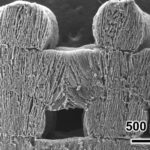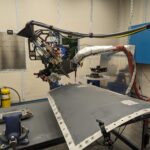Aside from the convenience it provides, food printing is also opening up new opportunities in terms of novel recipes and ingredients. One of the many ways companies are leveraging these abilities is through vegan and vegetarian alternatives. From ice creams to school lunches, food printing can add a vegetarian twist to lots of traditional cuisines. In a similar vein, Israeli start-up Jet-Eat is printing meats with authentic taste and texture using plant-based ingredients.
Ben Shitrit founded the company in an effort to provide healthy alternatives to meats that didn’t compromise on flavor. “Meat is characterized by four components: the muscle, the fat within it, myoglobin and a connective tissue” Shitrit explained. “We replicated, with our 3D printer and precise formulations, the complex matrix that is meat.”
Shitrit clarifies that the process is a form of multi-layered printing, where the machine prints in rectangular layers. Within each layer itself, the printers embeds properties such as flavor and color. These, he says, are crucial to the ways in which the consumer perceives the final product.
Vegan Alternatives
Jet-Eat hopes that their efforts can help create healthier food while also curbing the environmental impact of the food industry. The company particularly takes umbrage with all the food wastage and inefficiency in farming methods.
They started on their culinary crusade earlier this year. While they have just 5 employees, which may make the operation seem small, Jet-Eat has made great strides. They’ve already raised money from angel investors and are looking for seed funding in the future. They are collaborating with Technion-Israel Institute of Technology, using their labs to produce the meat.
Jet-Eat also took part in a four-month accelerator program launched by the European Institute of Innovation and Technology (EIT) Food Accelerator Network at the Technion. The company wound up as a finalist competing at the Food Venture Summit for a cash prize of $68,000. Jet-Eat’s ideas appear to be catching on despite the company being virtually less than a year old. They have ambitious goals in upending the unsustainable way we consume meat, but such concepts might become crucial in the near future.











